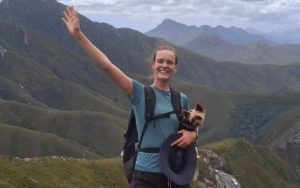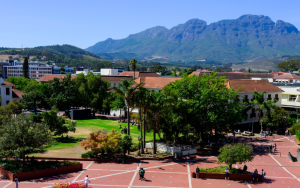
Prof Herman Kamper from the Department of Electrical and Electronic Engineering delivers his inaugural lecture.
Prof Herman Kamper explores how humans and machines learn language
- Prof Herman Kamper from the Department of Electrical and Electronic Engineering delivered his inaugural lecture on Tuesday 21 October 2025.
- He focuses on methods that enable machines to learn spoken language autonomously.
- He aims to develop better speech and language technology.
Prof Herman Kamper from the Department of Electrical and Electronic Engineering in the Faculty of Engineering at Stellenbosch University delivered his inaugural lecture on Tuesday 21 October 2025. The title of his lecture was “The science and engineering of language acquisition in humans and machines”.
Kamper spoke to the Corporate Communication and Marketing Division about the scientific and engineering benefits of developing methods that enable machines to learn spoken language autonomously, with minimal supervision.
Tell us more about your research and why you became interested in this specific field.
In my group we try to develop machine learning algorithms that can learn spoken language on their own, with very little guidance. This is very similar to the problems that infants face when learning their native language.
What makes this such an interesting problem is that it spans everything from signal processing and applied mathematics to cognitive science, linguistics and even philosophy.
How would you describe the relevance of your work?
We live in a time where many people are asking how artificial intelligence and machine learning will influence the future of humanity. But I think it is maybe even more relevant to ask whether machine learning can also tell us something about what makes us human.
Why is it important to develop methods that enable machines to learn spoken language by themselves?
The scientific reason is that we hope to learn more about how humans acquire language. We still do not know how much input infants should get from their caregivers, or how living in a multilingual environment affects language learning. If we had models that mimic the language acquisition process, we could start to answer these questions. We could also maybe start to identify language development problems in children earlier.
From an engineering perspective, we know that infants learn language much more efficiently than any machine learning algorithm today. So, the hope is that we can develop better speech and language technology by bringing in insights from infant learning.
Can you give examples of how your research is applied in real-world contexts?
In a recent project, we developed models that try to detect language development problems in very young children by processing stories that they told. In another project, we developed voice conversion systems, using insights from our infant-inspired models. These voice conversion systems can be used for everything from generating artificial voices for characters in games, to helping a user with a stutter obtain fluent speech in their own voice.
Looking into your crystal ball, what developments do you see in your field?
It is an exciting and scary time for our field. In the shorter term, I see many more speech technologies for educational and health applications. At the same time, I am also sceptical of how quickly we will be able to develop models that can learn as efficiently as humans. But I never thought I would see technology like GPT (a type of large language model) in my lifetime, so I have grown weary of making predictions (despite the previous sentence).
The higher education environment can be challenging. What keeps you motivated when things get tough?
It is a joy and a pleasure to teach, especially in undergraduate classes. Learning from my postgraduate students is a real honour. Being a researcher is a privilege, because you can have real deep friendships with people across the whole world.
At the same time, sometimes things do really get you down. Then friendships are crucial: I have learned to cry in front of friends, which always makes you feel better.
And then it is really helpful to take a step back every now and again and ask: “Why are we here?” The answer is to just marvel at this awesome creation – that is, what we were made to do. And in academia, you are paid to do that.
Tell us something exciting about yourself that people would not expect.
I once rapped Linkin Park in front of a few thousand people in the Cape Town International Convention Centre.
How do you spend your free time?
Trail running, running after kids, reading, playing guitar, braaiing, baking bread (not the fancy type), more reading and watching series (if the kids allow me).



